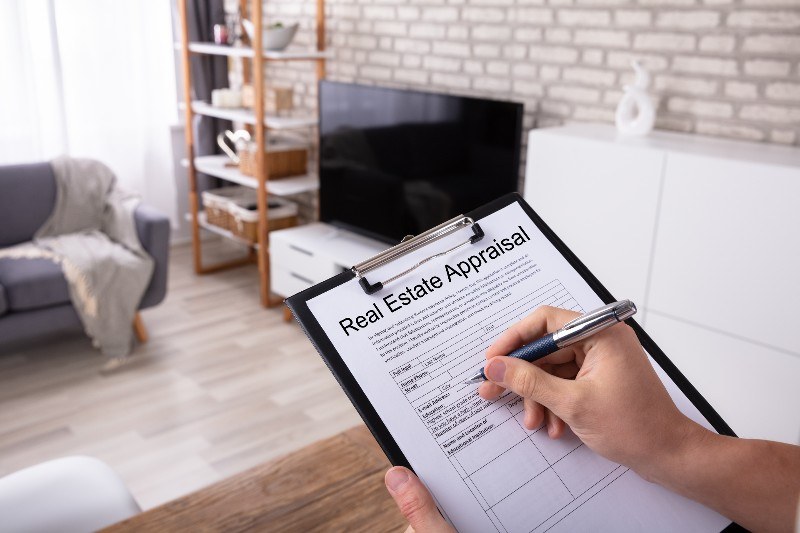Home appraisals can be a significant source of stress for both home buyers and sellers alike. If a home appraises for less than it sold for and the buyer is using a mortgage to finance their house, either the buyer or the seller needs to make up the difference in cash (or try to get the home re-appraised).
Many people misunderstand what can and can’t hurt a home appraisal. Here’s what you need to know.
What CAN Affect Your Home Appraisal
Although it may be obvious, it’s worth pointing out that certain things will “hurt” your appraisal in the sense that they will lower your home’s perceived value to the appraiser, even if you can’t easily change them. If your home has only one full bathroom, for example, it will likely appraise for less than a neighbor’s house with similar specs but two full bathrooms. While adding another bathroom to your home will increase the appraised value, most home sellers aren’t interested in doing that right before selling (especially considering the ROI!).
Here are some factors that can hurt your appraisal that the average seller does have the power to change within a short period of time and a modest budget.
Bad Neighbors
If your neighbors keep trash in their yard or like playing loud music 24/7, you might want to try and get them to clean up and keep it down while the appraiser is over. The Appraisal Institute has warned that bad neighbors can lower home values by as much as 10%. “Appraisers refer to this as external obsolescence, which is depreciation caused by external factors not on the property,” the Institute explains. If you live in an area with an HOA you’ll have an easier time enforcing better behavior, as most HOAs will take action against delinquent and irresponsible homeowners.
Old Batteries and Broken Cabinets
Appraisers tend to value properties in $500 increments. So when it comes to taking care of small issues around the house, these things can ultimately add up quickly. If the appraiser sees $300 worth of small damages around the home, that can easily turn into $500 off your appraisal. So take some time to address the wobbly banister railing and the broken cabinet hinge now, rather than later.
“Prior to an appraisal, the homeowner should ensure that functional features are working properly: for example, smoke and carbon monoxide detectors, or home alarm systems. They should also update old or outdated features, like wallpaper, or inexpensive-looking flooring or countertops," explains Aaron M. Adler, Owner of Appraisals Unlimited, Inc. "The cost of replacing these features should be less than $500, and that cost will easily be recovered in the appraisal."
Lack of Recent Comps
One of the metrics appraisers use to determine your home value is the price that similar homes nearby have recently sold for. Real estate prices, after all, are inherently about compared local value: a home that appraised for $200,000 in Baltimore, MD would likely be appraised for many times that amount in Brooklyn, NY, even if the homes had the exact same layout, features, etc.
Most appraisers only want to look at homes listed in the last 90 days, though sometimes they will look back as far as a year if few comps are available. If possible, they want to find homes in the same subdivision - or within a mile square radius. In more rural areas, appraisers may need to look further out.
So if there haven’t been many recent homes sold in your area, your home might appraise for less - especially in this crazy market where home values have been rising higher and higher each month.
According to a 2017 study published by Fannie Mae, "Appraising Below Contract" homes, or ABCs, are “associated with overbidding, rising prices, limited number of comps and distressed comps.” Unfortunately, in this red-hot market overbidding, rising prices and limited inventory are all commonplace.
There isn’t much you can do to fight a lack of comparables, but it’s something to keep in mind if you can be flexible on when you list your home. In most real estate markets, spring is the big season for listing, so late spring can often be the best time to list if you’re struggling to find recent comps.
How You Can Help Your Home Appraisal
Be Present for the Appraisal
Being present (but not overbearing) at your home appraisal is a good idea - this way you can communicate with the appraiser about recent updates, especially if the upgrades aren’t easy to see. This can be key to getting your house to appraise for more.
“One of the easiest ways to avoid a low home appraisal is to be an advocate for yourself. Make sure you know certain facts about your home and neighborhood, like your gross living area and neighborhood boundaries. If you catch a mistake, let the appraiser know—not the lender," explains Adler.
Remember, though, your appraiser is ultimately there to do a job - so don’t become a distraction yourself, or give the impression that you’re trying to distract from problem areas.
“Try to avoid being either too overbearing or too absent during the appraisal. An appraiser can’t do his or her job properly if they are being talked at by a chatty homeowner; likewise, it’s important to be available to answer any questions that arise during the appraisal,” advises Adler.
Home appraisal tip: have a detailed list of your recent upgrades ready to go for the appraisal.
Vet Your Appraiser
Not all appraisers are created equal.
“Local knowledge is important. Having an appraiser who is familiar with the architectural styles and building requirements of your neighborhood, and who knows how your neighborhood has changed and developed over the years, is key to an accurate home appraisal," says Adler. "Furthermore, a local appraiser will have a better understanding of the community around your neighborhood, for example, school districts and commercial centers.”
Due to regulations imposed after the 2007 housing crash, lenders and homeowners can no longer choose their appraiser. However, if your appraiser comes from 100 miles away and has no familiarity with your local area, this can be grounds for an appeal if it comes in too low.
What DOESN’T Hurt Your Home Appraisal
It’s important to know what won’t affect your home appraisal so that you can rest easy.
A Messy House
While an extremely messy home may impact an appraisal - because it prevents the appraiser from accessing certain parts of the home, and an extreme mess can begin to impact things like the condition of your floors - an untidy closet or a ton of cleaning supplies shoved under the sink aren’t going to matter.
“Generally speaking, a messy house with scattered clothes, toys or belongings does not affect an appraisal. Appraisers are professionals that have been trained to look past the clutter and assess the true value of the property,” explains Albert Lee, Founder of Home Living Lab.
Adler agrees. “The value of your home isn’t going to increase because you spent an afternoon tidying up," he says. "Scrubbing the fingerprints off the walls or touching up interior paint might look nice to a potential buyer, but a home appraiser is more interested in the age and condition of your home’s foundation, roof, and general structure, or whether you’ve made significant upgrades, like a fireplace or swimming pool."
To find out more about this, visit Does a Messy House Affect an Appraisal? And Other Appraisal FAQs.
Issues Under the Sink
Many people are surprised (and perhaps relieved) when their appraiser doesn't check under the kitchen sink. Why do appraisers not always check there - even if there could be a leaky pipe? It's important to remember that an appraiser is not an inspector. A leaky sink is an inexpensive fix that's unlikely to impact the appraised value of the home - and if there are larger issues with the plumbing in your home, it's likely going to be beyond the appraiser's scope to uncover it.
The Bottom Line
According to Fannie Mae, appraisals come in low only about 8% of the time - but recent home sellers might experience an uptick in appraisal issues due to the extra-hot market and comps lagging behind true market value.
It's worth keeping in mind that if an appraisal comes in low, you can appeal it (or order a new one from another appraiser). While appraisals are supposed to be a replicable process, at the end of the day there is some subjectivity involved - and this subjectivity can move an appraisal by thousands of dollars. It's also a good idea to check your appraisal for mistakes - is the square footage correct? What about the build date? Etc.
For Further Reading



